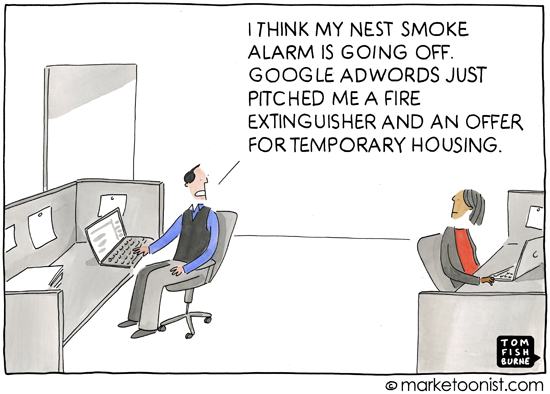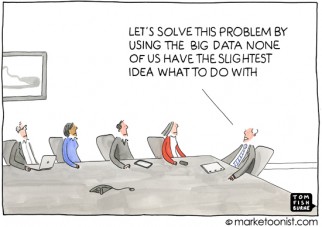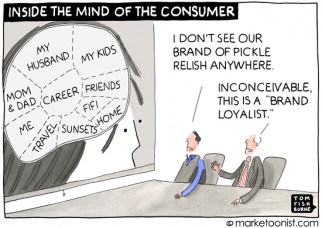Last week’s news that Google would buy Nest triggered a lot of discussion on the future of marketing (this cartoon was inspired by a joking tweet from Valleywag’s Sam Biddle). Nest makes smart home devices like learning thermostats (which I personally love) and smoke alarms, with the goal of creating a conscious home. It also collects a lot of data.
The news jumpstarted a broader conversation about the Internet of Things, which was also the theme of CES this year. CES showcased a wide range of Internet-enabled objects, including a smart tennis racket and a Bluetooth toothbrush that tracks your dental hygeine.
As everyday objects in our homes, cars, and general lives start to connect, this has the potential to bring tremendous utility to people. For marketers, it also teases mouth-watering insight into and access to individual consumers.
Nest CEO Tony Fadell said their privacy policy wouldn’t change, at least for the time being. But, as Techcrunch commented this morning:
“Google and Nest have the potential to do great things together for users and consumers, but don’t expect that to happen without users giving up some more of their precious data to the search giant. All that remains to be seen is how that will happen, and what people get in exchange for that access.”
The pressure will be there for new devices in the future. Imagine the field of ad retargeting applied to the Internet of Things. There will definitely be a firestorm of debate about data security and privacy as these devices propagate. But this also has the potential of getting us closer to the Minority Report dystopia I parodied last year.

As with any new technology, the opportunity is in how the marketer wields it. I’d love to hear your thoughts on where marketing is headed with the Internet of Things.
(Marketoonist Tuesday: I’m giving away a signed print of this week’s cartoon. Just share an insightful comment to this week’s post by 5:00 PST on Tuesday, an extra day this week because of the MLK holiday. Thanks!)



chris says
The Nest products have been very interesting so far. Although I dont own any yet (Im in the UK), they were very much on geek list. Were.
After everything thats been revealed with the NSA, the idea of google digging into the internet of things becomes very scary. The geek in me wants wifi & bluetooth in everything. But now it feels less like a step forward & more like giving up a huge amount for not much in return. Its not so much worry over an individual object, but the future of many objects pooling data together in a single place. Nest was far more interesting before the back end was patched into google severs.
I never thought I could get this worked up about a fire alarm.
sbg says
Chris above said it just right.
John Anderton says
Interactive advertising that Philip Dick suggested in the Minority Report and you have hilariously interpreted here is not that far away. What airlines and grocery stores call loyalty cards are also tracking systems that connect tastes and preferences to timing: I get emails with coupons for chocolate syrup when mine is running out, and for great trips around Spring Break. Add that to my Google search patterns and a sophisticated portrait emerges that I have enabled through providing my details on FaceBook and LinkedIn. Unlike Winston Smith, who was spied on and overcome by the State in 1984, I cheerfully hand over everything to the machine, for a few pennies off my carton of milk. That willingness to surrender would have surprised Orwell, but Dick knew it was coming. Nice job with the cartoon!
JPA
JL says
One say people communicate on their weaknesses
well, google’s motto is “don’t be evil” 😉
I did not wait Snowden/NSA to be scared by Google
I will never have a connected-to-google device in my home
ralph de cologne says
Well, if it only was just marketing that is affected. Just read David Suarez’ novels “Daemon” and then “Freedom” and you’ll realize where all this could/will(?) take us!
Jason says
Completely agree with Chris.
In addition:
“As with any new technology, the opportunity is in how the marketer wields it.”
I think that actually – especially when we are looking at the collective reaction to data use such as this – this sentence should become:
“As with any new technology, the opportunity is in how ALL marketerS wields it.”
It only takes one, ‘slightly careless’ shall we say?, marketer to sow the seeds of doubt in the consumer’s mind for all the thousands of other well-meaning/ benign uses of the tech to be undermined completely.
DSprogis says
Now that’s just plain funny, on so many levels!
Thanks for the laugh, you lightened my day.
GPabby says
Absolutely flippin’ brilliant. Nice work today, Mr. Fishburne. Love it.
Allen Roberts says
Love the cartoon Tom.
Again, demonstration of the old marketing adage, a picture……….(everyone can finish it themselves)
Allen
Elijah Zu Bailey says
My variation on the topic based on the leading image: A good example of how we went from an analogue to a digital version of things in a very rapid way, a way that has the masses follow as if nothing happened. Thanks to new generations. the question becomes in this example, you used “THAT” archaic system to warn you there’s a fire? And you needed to be there to know about it? At least they were sending firefighters automatically instead of automagically, but that is a thing of the past. Do not worry anymore, surveillance of these infrastructures takes a quick kick combo to get things moving.
What if these sensors go haywire or we hack the devices to have wrongly imputed requests for assistance, a bit like prank-calling 9-1-1? Electronic terrorism will surely be one of the games my kids will enjoy doing in 20. And assistance services filtering out bogus requests until there’s a bug and someone dies thanks to an algorithm. Funny how this isn’t shown to the masses, as working with many companies shows how chaotic any system really is in the internal background because of these same humans.
—
That said, marketing will also do its very mistakes. If you never clicked an ad, how to signal your interest in them? I do so on video (YouTube) so I can watch ads on topic I really enjoy watching, nothing wrong with that tracking in my mind. Why look at things you don’t need? I’m all electronics: one’s grandma, surely not. Why can’t she get ads for the things she really need?
Some products, maybe I need but don’t want advertised since I know where to get them? Am I shopping for the item? No. Am I looking for a better deal? Maybe. Will code adjust accordingly? Surely not. Why? We don’t discuss these things yet. It’s all hush-hush, partly because of the classic “it’s related to national security” excuse, the modern “my homework got eaten by a dog” to deviate from responsibility, and in this case, company secrets are oh-so important to keep for our dear shareholders.
Next, think for the assisting services. I am a geek, and I answer questions related to my geekiness. Which product to buy, why, specs, comparisons, hacks possible, drawbacks, how the company deals with customer support, shipping issues, the retail market’s perspective and so-on. Am I doomed to receive related materials just because I help others discover that information through analogue/meatspace communication platforms. Yes. It’s all very interesting, as the discussion is still in its infancy. The masses will get through it just fine and be gold mines to be abused daily. Those with a higher-than-100 I.Q. will ask that these questions get asked EVERYWHERE. Haven’t seen the +1s on ads in some time now. Because these same <100 I.Q. people think that recommendations ARE evil, when in reality was the basis for free endorsements that many of us would've liked to do if willing.
Instead of providing friends with my location, I give them my foursquare profile. Instead of recommending a product, I'd refer to these ads. A discussion I'll stop having now as it's getting a bit long and many are of the TL;DR type. Cheers, great article.
Chris says
the Internet ofThings seemed like an awesome idea, the Nest devices seemed like a fantastic example, until Snowden. Now, for me at least, they seem dangerous. I dont want Google to know when I’ve burnt some toast. I feel like I’ve gone from an early adopter geek to a paranoid laggard 🙂